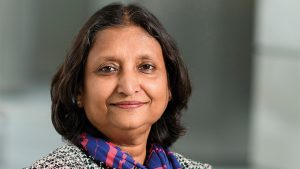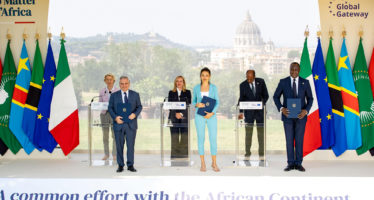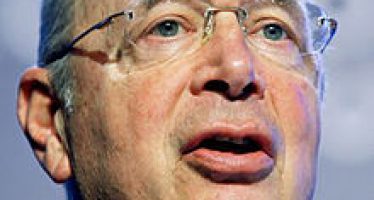Anshula Kant, MD and CFO of the World Bank Group: Power of Capital Markets in the Battle Against COVID-19

MD and CFO of the World Bank Group: Anshula Kant
Managing Director and World Bank Group CFO Anshula Kant reflects on the crisis engulfing the world, and the opportunities we have to build back.
I can’t remember a time in my life when a single event has mobilised the entire world, with health care workers, governments, the private sector and multilateral development banks all focused on the same problem.
Each organisation, each sector has a role to play – including capital markets. But how exactly can bond issuers and investors help?
The pandemic has cost lives and disrupted livelihoods on an unimaginable scale. As governments begin to slowly reopen their economies and societies, the effects of the crisis will linger, especially for poor and vulnerable people.
Countries’ financing needs are rising dramatically for both the short and medium term, first to tackle the health emergency and then to start working toward a sustainable recovery. Many developing countries rely heavily on revenue sources such as remittances, commodity exports, and tourism and are likely to be disproportionately affected by an anticipated global recession. Tax revenues are falling as well, while these countries’ access to financial markets will be sharply curtailed.
Even before the crisis, capital markets were critical for strengthening outcomes for countries and their people. As access to these markets deteriorates for many, the multilateral development banks (MDBs) provide an essential service. These institutions maintain long-term country engagements and can act swiftly to make funds available. MDBs can be one of the few resources countries can tap into, especially during market volatility.
As the pandemic continues to unfold, the World Bank Group is acting fast and decisively to help countries respond and get their development progress back on track: we have pledged to make available up to $160bn over 15 months. We are assisting over 100 countries to set up emergency health operations, protect households, save jobs and businesses, and get money to people most in need. Our assistance will also include support to address the medium- to long-term social and economic repercussions of the pandemic.
We are also collaborating with other MDBs and bilateral agencies to increase co-financing for operations so projects can quickly expand, and our partner institutions have also made commitments of between $70 and $80bn.
The International Bank for Reconstruction and Development (IBRD), the original member of the World Bank Group, is one of the largest global bond issuers, offering safe, liquid, and high-quality investments to direct global savings to critical use. It has been pioneering capital markets for over 70 years, and the franchise we have created provides a platform for innovation and leadership. We use the triple-A-rated credit quality of IBRD and, recently, the International Development Association (our fund for the poorest countries) to build and deepen capital markets and scale up impact as we raise awareness of global issues such as gender equality, access to clean water and ocean resources, food loss and waste, and health and nutrition. Our dialogue with investors, transparency on how we use bond proceeds, and engagement on global issues are particularly important now.
Over two days in April, IBRD raised $15bn from global investors. This included the largest-ever US dollar-denominated bond to be issued by a supranational, as well as benchmark issuances in British pound, Euro, and Swedish krone through our Sustainable Development Bonds. We have since followed up with another $4bn benchmark issuance.
Our ability to tap capital markets during difficult times demonstrates the interest investors have in supporting sustainable programmes that strengthen countries’ capacities to fight the pandemic.
But this wasn’t easy. We laid the groundwork with investors over years. This time we reached out to explain the World Bank’s health programme, and how we are helping countries strengthen their response and health systems during the pandemic. We expanded the dialogue with existing investors and welcomed new ones.
Since the crisis began, there has been increased interest in ESG investing. Globally, we see a variety of approaches, ranging from “COVID response” bonds to social and sustainable bonds that are embedded within an issuer’s existing issuance framework. Many investors are taking a holistic approach, connecting their investments to impact and progress on the Sustainable Development Goals (SDGs). As of mid-May, investors have supported more than $65bn in COVID-related issuance [1]. The benefit of such bonds is the transparency and disclosure on use and allocation of proceeds, so investors can seek return alongside impact. Communication with investors and other market stakeholders remains key as the focus steadily shifts to impact and sustainability.
The pandemic has crystalised the opportunity for sustainable investment to benefit everyone. Issuers and investors can lead the way, but the focus must be on transparency. Issuers should be aware that investors are assessing the risks and opportunities of their investments through the lens of ESG and/or the SDGs. Issuers should explain how they are using investors’ funds to make a positive difference for society. And investors must look at their entire portfolio to see how they can use the power of investment to contribute to sustainable development, and demand transparency from issuers so that they can make informed decisions.
The pandemic is still in its emergency phase in much of the world. But countries are already recognising that it will be imperative not just to recover, but to build back stronger. By connecting investments to sustainability goals and by ensuring transparency, issuers and investors can help in the fight against the pandemic and shape a more resilient and sustainable future for all.
[1] According to the FT (May 15, 2020): ft.com/content/03dbe400-1bea-4475-bda7-2fbc1d9ce062
About the Author
Anshula Kant was appointed managing director and chief financial officer of the World Bank Group in October 2019.
She is responsible for financial and risk management of the group. Among other key management duties, her work includes oversight of financial reporting, risk management and mobilisation of IDA and other financial resources.
Through her work at the State Bank of India (SBI), Kant gained more than 35 years of experience in the financial industry. As CFO of SBI, she managed $38bn of revenues and total assets of $500bn. Most recently, she served as SBI managing director from September 2018 to August 2019.
With direct responsibility for SBI’s Risk, Compliance, and Stressed Asset Portfolio, she led the creation of investment opportunities while empowering risk management throughout the bank.
Anshula Kant earned her Bachelor’s degree with honours in Economics from Lady Shri Ram College for Women, and completed her Master’s in Economics from Delhi School of Economics.
You may have an interest in also reading…
Vladimir Putin Talks About BRICS
BRICS’ relatively new phenomenon attracts increased global attention due to the optimistic predictions about its development, especially against the backdrop
Africa Finance Corporation: Powering Africa’s Future Through Pragmatic Investment and Infrastructure
The Africa Finance Corporation is redefining development on the continent by championing bankable, climate-resilient, and inclusive infrastructure projects. With US$17bn
World Economic Forum Calls for Resilient Dynamism
David Cameron, Angela Merkel and the prime ministers of Russia and Italy will address the World Economic Forum Annual Meeting,

















































































